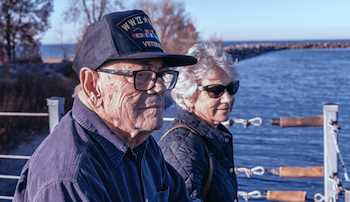VA Dependency and Indemnity Compensation (VA DIC) is a financial benefit offered to the family of veterans who have passed away or been disabled due to a service-connected injury or disease. Typically, VA DIC payments are offered to the survivors of veterans if they meet certain eligibility and qualification standards.
What Is VA Indemnity Compensation?
VA Dependency and Indemnity Compensation is a tax-free monetary benefit offered by the U.S. Department of Veterans Affairs (VA) to the survivors of veterans and their loved ones.
 VA DIC benefits are available only to the loved ones of veterans who meet certain qualifications and standards, such as if the veteran died from a serious injury or disease stemming from their service.
VA DIC benefits are available only to the loved ones of veterans who meet certain qualifications and standards, such as if the veteran died from a serious injury or disease stemming from their service.
One such service-related illness is mesothelioma, a cancer caused by asbestos exposure.
Veterans with mesothelioma may have been exposed to the dangerous toxin asbestos during their military service, which caused their cancer later in life. In these cases, surviving spouses and/or dependent children of veterans may be eligible for VA DIC and additional mesothelioma VA benefits.
The Mesothelioma Veterans Center team can help determine if you qualify for VA DIC or other VA benefits.
Who Is Eligible for VA Dependency and Indemnity Compensation?
Veterans' families must meet VA DIC eligibility requirements to receive VA compensation.
VA DIC is paid to eligible survivors of:
- Service members who passed away while on active duty
- Veterans whose cause of death was a service-connected injury or disease
- Veterans who did not die in the line of duty but were totally disabled by a service-connected disability
If a veteran has mesothelioma or passed away from it, it must be shown that they developed this cancer from military asbestos exposure. The VA considers mesothelioma to be a total disability.
In fact, veterans are at a higher risk of mesothelioma due to widespread military asbestos use between the 1930s and early 1980s.

Qualifications for VA DIC
In order to qualify for VA DIC, there are also specific requirements for the surviving spouse and/or dependent children of a deceased veteran.
For surviving spouses, one of the following must be true:
- You had a child with the veteran
- You married a veteran who died from a service-connected injury or disease and the marriage began within 15 years of discharge
- You were married to the deceased veteran for at least one year
If separated and with children, the surviving spouse must not be at fault for the separation and not be remarried to qualify.
Qualifications for surviving children include:
- The veteran parent died because of a service-connected injury or disease
- The child is under the age of 18 or between the ages of 18 and 23 and attending school
- The child must not be married
Certain helpless adult children may also be eligible.
Getting mesothelioma VA benefits can be a simple process. Start a VA benefits claim right now.
How Long Does it Take to Get VA DIC?
After you file your claim for VA DIC, it will take several months for the VA to approve it and for you to begin receiving benefits. As of February 2024, the average amount of time for the VA to process disability-related claims was 158.4 days.
However, our team may be able to help you access VA DIC benefits in less time. Call (877) 450-8973 to learn more.
VA Dependency and Indemnity Compensation Rates
As of 2024, the monthly standard VA DIC payment for spouses and other dependents is $1,612.75 if the veteran died on or after January 1, 1993. However, depending on certain qualifications, added monthly payouts may be awarded on top of this standard rate.
Use our VA DIC calculator below to determine how much money you could receive.
| If the following is true: | You may qualify for: | Added monthly amount (USD): |
|---|---|---|
| Veteran had a 100% VA disability rating for 8 years or more before they died and you were married to the veteran during those years | 8-year provision | $342.46 |
| You're disabled and need help with daily life | Aid and Attendance (A&A) | $399.54 |
| You're so disabled that you can't leave your house | Housebound allowance | $187.17 |
| You have 1 or more kids under 18 years of age | Transitional benefit and DIC apportionment rate | $342.00 for the first 2 years after the veteran died (plus $399.54 per qualifying child) |
VA DIC survivor benefits are tax-exempt, meaning you won’t have to pay any taxes on the money you receive.
VA DIC and Other Financial Resources
Besides VA DIC, spouses and other loved ones may qualify for other mesothelioma VA benefits if their loved one passed away from this cancer. These include survivors pensions depending on their income, burial reimbursements, and funeral honors for the veteran's memorial service.
Veterans and civilians with mesothelioma may also be eligible for financial compensation through a private claim or an asbestos trust fund claim. Private mesothelioma settlements award an average of $1 million.
Filing private claims won't prohibit veterans or their families from receiving their VA benefits.
Get Help to Access Veterans Mesothelioma Compensation
 If your spouse or parent is a veteran with mesothelioma — or has died from this cancer — we encourage you to explore and pursue VA benefits for mesothelioma, including VA DIC.
If your spouse or parent is a veteran with mesothelioma — or has died from this cancer — we encourage you to explore and pursue VA benefits for mesothelioma, including VA DIC.
However, trying to gather evidence to support a claim on your own can be confusing.
We know how hard it is to see a loved one suffer from cancer, especially brave veterans who served their country, and we will do anything we can to assist your family through the process.
File for VA mesothelioma benefits today.
VA Disability and Indemnity Compensation FAQs
What is the 10-year rule for DIC?
The 10-year rule means that a veteran must've had their service-related health problem for at least 10 years prior to their death — if they didn't pass away from the condition in question — for their survivors to receive VA DIC.
This rule may not always apply if a family lost a veteran to mesothelioma for two reasons.
First, many cases of mesothelioma among veterans are related to their military service. Because of this, if a veteran passes away from mesothelioma, their family would then qualify for VA DIC and the 10-year rule wouldn't go into effect.
Can you get DIC and VA disability at the same time?
VA disability compensation is a benefit awarded specifically to veterans, not their loved ones.
The only way you'd be able to get both DIC and VA disability is if:
- You and your loved one were both veterans
- Your spouse has passed away
- You are disabled
Call (877) 450-8973 to learn about the mesothelioma VA benefits that may be available to you.
Is VA DIC a lifetime benefit?
Yes, VA DIC is a lifetime benefit in many cases. Spouses will often receive VA DIC for their entire life — even if they remarry, in some cases.
Children can receive VA DIC until they're 18 or, if they're in school, until they're 23.
How long does VA Dependency and Indemnity Compensation last?
VA DIC benefits are considered permanent for a surviving spouse if the recipient doesn't earn more than the allowable maximum to continue receiving benefits.
For children, the VA DIC benefits will only last until age 18 in most circumstances. If the child is enrolled in higher education, the benefit extends until age 23 or until they are no longer enrolled.
Can you remarry and keep mesothelioma VA DIC benefits?
Possibly. VA DIC benefits are available to a surviving spouse, and you are no longer considered a surviving spouse of one person when you marry another. This means that VA DIC benefits are generally lost upon remarriage.
The exception the VA has created allows surviving spouses to remarry and still receive VA DIC benefits if they are at least 55 years old when they remarry.


